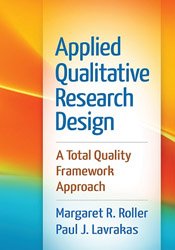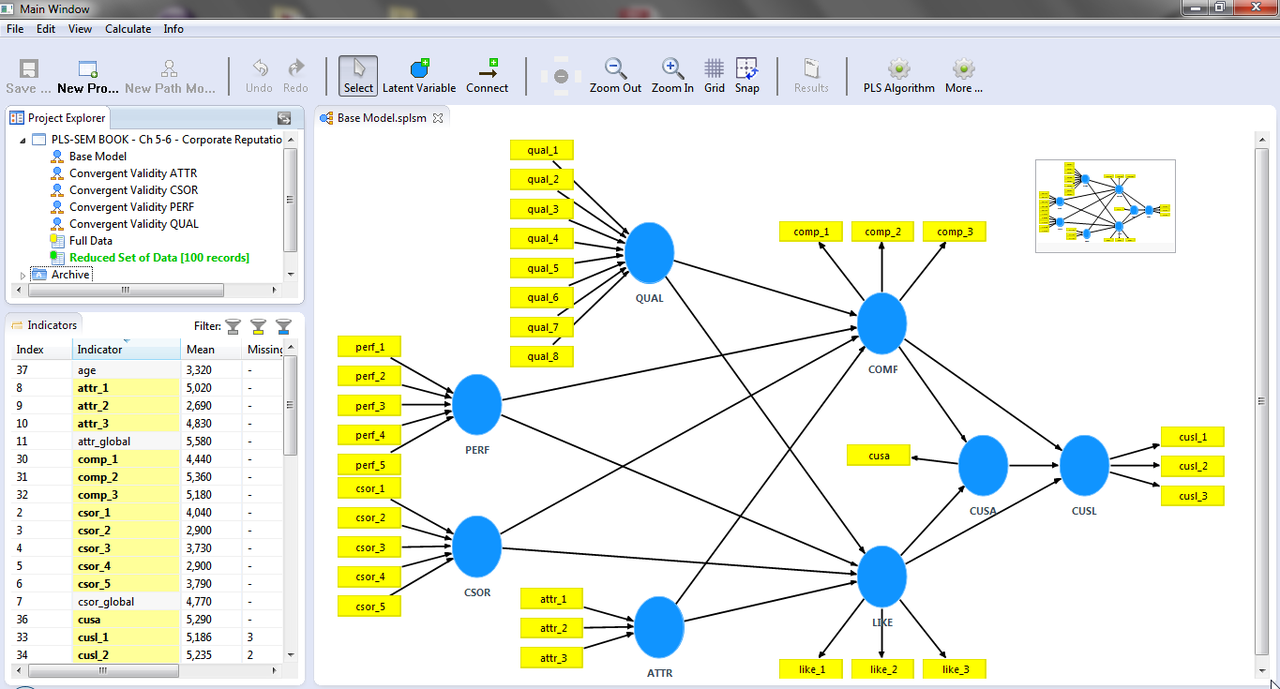Designing qualitative research with the Total Quality Framework
Research design is the focus for the first quarter of 2023. Find the unfolding series here.
How is quality evaluated in qualitative research designs?
If you are planning a qualitative study, chances are there will be a review process for your proposal. Needless to say, it is in your best interest to develop a proposal that will require few revisions. Preventing obstacles is preferable to negotiating them!
How will others judge the merit of the research, and the viability of the approach you intend to take? While your institution or grant administrator might have their own criteria, you want to make sure the study will be valued by the field at large, including fellow scholars and stakeholders with an interest in the results. Margaret Roller’s and Paul Lavrakas' Total Quality Framework is a straightforward tool for thinking about qualitative research designs. Margaret describes it as “a way for qualitative researchers to develop critical thinking skills to apply in designing, conducting, and interpreting their research so that the studies are more likely to (a) gather high-quality data, (b) lead to more robust and valid interpretations of the data, and (c) ultimately generate highly useful outcomes.”
Learn more about each TQF component:
Credibility: From a TQF perspective, credible qualitative research is the result of effectively managing data collection, paying particular attention to the two specific areas of Scope and Data Gathering.
Analyzability: Analyzability is concerned with the “completeness and accuracy of the analysis and interpretations” of the qualitative data derived in data collection and consists of two key parts – Processing and Verification.
Transparency: When the data has been collected and thoroughly processed and verified, the qualitative researcher is left with the job of effectively communicating what went on in the research study and how the researcher drew interpretations from the analysis.
Usefulness: Usefulness refers to the ability to do something of value with the outcomes.
Learn how to use the TQF when developing a qualitative research proposal
Download compilations that include articles and blog posts by Margaret Roller:
"TQF Research Proposal: 11 Articles on the Total Quality Framework Qualitative Research Proposal" includes a compilation of articles on using the TQF when developing a proposal. Begin by taking a look at “Research Questions & Hypotheses” on page 11 for discussion about framing a research question or problem.
“Is It Good Research? Quality Design in Qualitative Research: Quality Approaches That Embrace Diversity & Inclusion” is a compilation of five articles. These articles are a reminder that rigorous research strategies pertaining to sampling, data collection, and analysis transcend the paradigm, positivist-non-positivist debates. They prioritize inclusion and fairness while exploring the complexity of human realities.
More Methodspace posts about research design
There are lots of questions to consider when using videoconference platforms for scholarly interviews.
From the moment social media platforms began to welcome user-generated content, researchers have looked for ways to study it. Learn more with open-access articles about social media platforms.
Julianne Cheek and Elise Øby, co-authors of the book Research Design: Why Thinking About Design Matters, discuss how to make decisions about what qualitative, quantitative, or mixed methods data to collect and how to do so. This post is the third of a three-part series of posts that feature ten author interviews.
What if we didn’t have to go fast to do our academic work and research? What if we could embrace the spaces and places around us to slow down? What could that mean for us personally, professionally, and in how we relate to social justice and ecological issues?
Julianne Cheek and Elise Øby, co-authors of the book Research Design: Why Thinking About Design Matters, discuss how to make decisions about methodology in this collection of video interviews. This post is the second of a three-part series of posts that feature ten author interviews.
Chart research directions that take you to the roots of the problem. Learn more in this guest post from Dr. Donna Mertens.
We need to think about research before we design and conduct it.
Julianne Cheek and Elise Øby, co-authors of the book Research Design: Why Thinking About Design Matters, discuss the first three chapters in these video interviews:
Chapter 1 – Research Design: What You Need to Think About and Why
Chapter 2 – Ethical Issues in Research Design
Chapter 3 – Developing Your Research Questions
Partial least squares structural equation modeling (PLS-SEM) enables researchers to model and estimate complex cause-effects relationship models
How do researchers make design decisions about the methodology and methods?
In-depth comprehension and interpretation of social events, human experiences, and behaviours are often the main goals of qualitative researchers. Learn about the primary concerns of qualitative researchers in this guest post by Pinaki Burman.
Research can often feel like an overwhelming process. If you are a novice researcher, there can be a lot of new terminology to learn too. This is where research road mapping can help!
These difficult times present challenges for researchers. Find five original posts by Robert Kozinets about using Netnography to study sensitive topics.
Looking back at 2023, find all posts here!
We explored stages of a research project, from concept to publication. In each quarter we focused on one part of the process. In this recap for the year you will find original guest posts, interviews, curated collections of open-access resources, recordings from webinars or roundtable discussions, and instructional resources.
Methods Film Fest!
We can read what they write, but what do researchers say? What are they thinking about, what are they exploring, what insights do they share about methodologies, methods, and approaches? In 2023 Methodspace produced 32 videos, and you can find them all in this post!
Let’s begin this quarter’s exploration of research design by thinking about the research problem or topic. Who decides what to study?
Learn how to design and defend your PhD research with the Idea Puzzle software from Ricardo Morais.
Dr. Stephen Gorard defines and explains randomness in a research context.
Have you seen Dr. Gorard use card tricks to teach research methods? Watch this video!
Some of us feel that technology is everywhere, but that is not the case for everyone. Inequalities persist. What do these disparities mean for researchers?
Mentor in Residence Stephen Gorard explains how to use population data.
Margaret Roller compiled collections of articles about qualitative data analysis into useful mini e-books available for open-access download.
In this research conversation with Janet Salmons, Julianne Cheek and Elise Øby discuss the importance of an iterative, design-thinking approach to research.
What is autoethnography? How do researchers study their own experiences? See this post for definitions and open-access articles that explore this qualitative method for collecting data.
Researchers who want to collect both qualitative and quantitative data with mixed methods will find this conversation of interest. Drs. Linda Bloomberg and Merle Werbeloff walk through the process of designing and conducting mixed methods studies.



























The process for researching literature on research methods is somewhat different from the process used for researching literature about the topic, problem, or questions. What should we keep in mind when selecting methods literature?